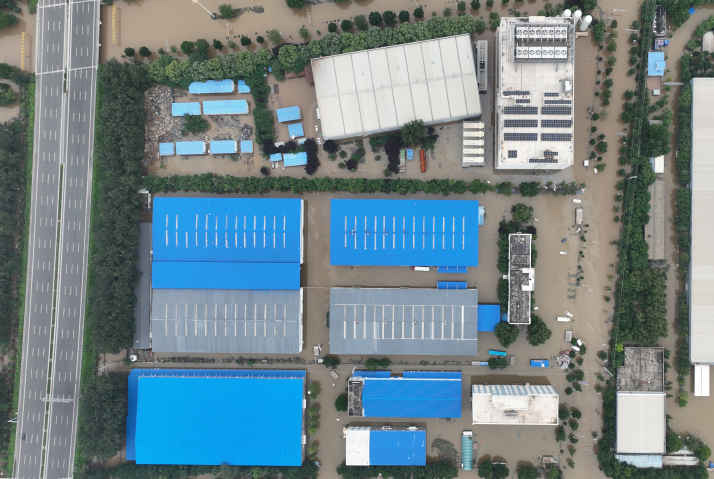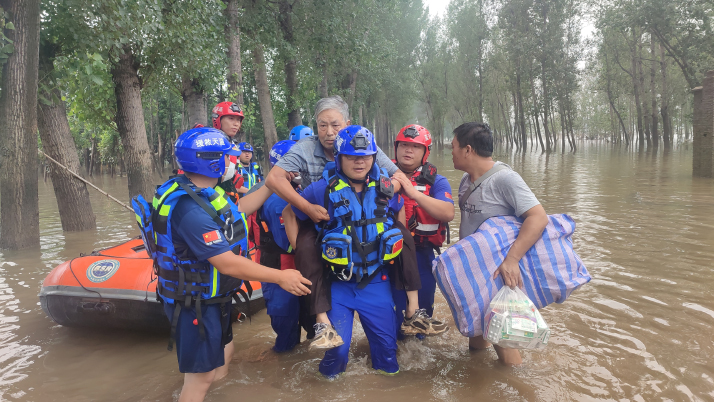| China |
| Flooded book warehouse receives attention and assistance | |
|
|
 (Top) The area surrounding Books China warehouse in Zhuozhou City, Hebei Province, remains flooded on August 5 Rescue workers evacuate villagers during the floods in Zhuozhou on August 2 (CNSPHOTO)
After days of downpours brought on by typhoon Doksuri from late July to early August, BooksChina.com (Books China), one of the country's first domestic online book sales platforms, suffered a devastating loss. Over 4 million books were soaked and damaged to varying degrees in its storage center located in Zhuozhou City, Hebei Province, one of the most severely affected regions during the disaster. Books China said as a small company that has meager profits, it hasn't recovered from the difficulties. It managed to get through the three-year-long pandemic and then encountered this disaster. "We will strive to save ourselves and survive," a post on its official account on Chinese tech giant Tencent's Weixin super app read on August 3, the third day that the company's storage facilities had been flooded. The company's adversity captured the attention of millions of netizens nationwide, many of whom decided to lend it a helping hand in whatever way they could. When disaster strikes From 8 p.m. on July 29 to 7 a.m. on August 2, Beijing recorded its heaviest rainfall in 140 years. The torrential rains caused flash floods in several districts of the Chinese capital as well as several localities in its surrounding Hebei Province. By the end of August 8, flooding had led to the loss of 33 lives in Beijing, Xia Linmao, Beijing's Executive Deputy Mayor, said. The disaster had also caused heavy property losses, toppling 59,000 houses and damaging many more, Xia continued. Zhuozhou, some 70 km from the center of Beijing, saw 60 percent of its urban areas immersed in water up to 6 meters deep. The flood thrust the formerly little-known city into the public spotlight, as many book publishing enterprises based there suffered a fate similar to that of Books China. Located on the southwest of Beijing, Zhuozhou is home to the storage centers of many publishing houses. As of late 2021, China had 587 publishing houses, according to the China Press and Publication Administration. A major publishing zone in Zhuozhou covering an area of more than 26 hectares has the warehouses of some 100 publishers. During the storm, many of them were entirely drenched by the muddy waters. Zhishang Shengyin, which translates as "Voices on Paper," is a bookstore chain headquartered in Beijing. Its roughly 3,000-square-meter warehouse in Zhuozhou was flooded in water as deep as 2 meters; four fifths of the books stored there were destroyed and the trucks used for their transportation were soaked, putting an abrupt halt to the distribution of online orders and resulting in an estimated loss of 50 million yuan ($6.93 million). Books China's warehouse in Zhuozhou saw nearly 80 percent of its inventory there damaged by the floods, including many rare, out-of-print and early-edition ones. "Even if the water doesn't reach all the books instantly, soaking will continue to spread; there's no way to save them," Ran Zijian, President of CNTIME, another book publisher severely affected by the floods, told the press.  Rescue workers evacuate villagers during the floods in Zhuozhou, Hebei Province, north China, on August 2 (XINHUA)
Against the odds On August 4, Huang Ping, founder and General Manager of Books China, attended his first livestream from Books China's online store on e-commerce titan Alibaba's Taobao shopping platform. Since starting his business in 1998, Huang usually stays behind the scenes. But this time around, he wanted to address the many netizens who'd demonstrated how much they actually care about the future of Chinese book companies. He said that after facing "the deadliest blow the company has encountered in its 25 years of history, the next step is to find ways to make the enterprise survive." The floods have made things worse for publishing houses already struggling in the digital era as developments in digital technology, from smartphones and computers to e-book readers, have impacted the way consumers search for and buy reading materials. Even before the floods hit, Books China, too, had already seen sales decline. "Almost every month this year, we were in deficit," Li Qing, an employee of the company, told Guangdong Province-based magazine New Weekly. The size of the national book retail market in 2022 decreased by 11.77 percent year on year, with the size of the physical store retail book market declining by 37.22 percent year on year, according to a report on China's book retail market released by Open Book, an agency offering consulting, research and survey services in the book industry. With over 4 million of its books now ruined, Books China is seeking new ways to recover, just as the concerned public had hoped it would do. Wasting no time, the company on August 2 launched a promotional package including at least four books that are stored elsewhere, a bookmark and a badge commemorating the tragic event. The package sells at 99 yuan ($13.7), with the actual value of the books being 120 to 200 yuan ($16.6 to 27.7). At the time of writing, some 200,000 packages had already been sold across a range of online platforms. "My family and I kept a close eye on any news related to Books China and we purchased the package the moment it was released," Wang Xinyuan, a Beijing-based book lover as well as a Books China store member, told Beijing Review. "We want to help in whatever way we can. Like many netizens have already said, we, too, are willing to purchase some dried books—if possible." Despite these kind words, Huang said his company will not be selling dried books—no matter what. "These books are unreadable and may contain dirt and bacteria. We will not sell this kind of book to our customers," he explained. An eager clientele aside, a host of online retail platforms and public figures are also offering their support. Taobao, Tmall (another Alibaba shopping site), Douyin (China's TikTok) and Pinduoduo (the second largest e-commerce player behind Alibaba in China) have all launched special portals dedicated to selling books. Influencers and celebrities have also called on their followers to "buy a book for Zhuozhou." With the public's encouragement, Books China is keeping its chin up. "Many of our customers have sent us messages on social media, saying '… Everything will be ok'," another post on the company's official Weixin account read. "Plus, the disaster has led our brand to become known far and wide." "I hope our employees can keep their jobs and our company can survive," Huang said. "The most important asset of a company is its people. As long as the Books China team is still there, so is the company's most precious asset." (Print Edition Title: An Outpour of Love) Copyedited by Elsbeth van Paridon Comments to luyan@cicgamericas.com |
|
||||||||||||||||||||||||||||||
|
